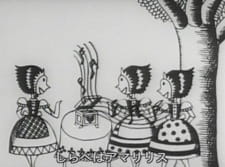
The final nine measures of the first ballet, labelled "Le son de la clochette auquel Circé sortit de son jardin" (the sound of the bell at which Circe leaves her garden), contain a tune that forms the basis of a nineteenth-century arrangement by Henry Ghys, which the latter mistakenly attributed to the air "Amaryllis" composed by Louis XIII. In Japan, this arrangement was given Japanese lyrics and introduced as "Amaryllis" on NHK's Minna no Uta series in 1968. The tune has since become well known as a French folk song there and its melody can be heard today as a chime signaling the hour over the PA systems of some schools and rural municipalities. (Source: alchetron.com)
The final nine measures of the first ballet, labelled "Le son de la clochette auquel Circé sortit de son jardin" (the sound of the bell at which Circe leaves her garden), contain a tune that forms the basis of a nineteenth-century arrangement by Henry Ghys, which the latter mistakenly attributed to the air "Amaryllis" composed by Louis XIII. In Japan, this arrangement was given Japanese lyrics and introduced as "Amaryllis" on NHK's Minna no Uta series in 1968. The tune has since become well known as a French folk song there and its melody can be heard today as a chime signaling the hour over the PA systems of some schools and rural municipalities. (Source: alchetron.com)

Theme Song Arrangement

Animation Director